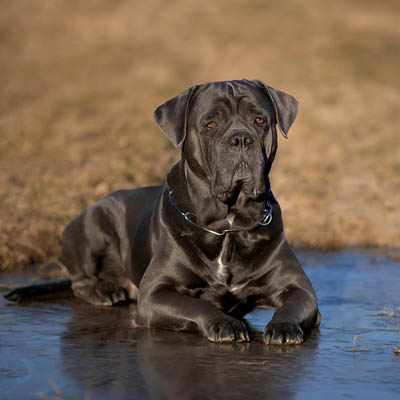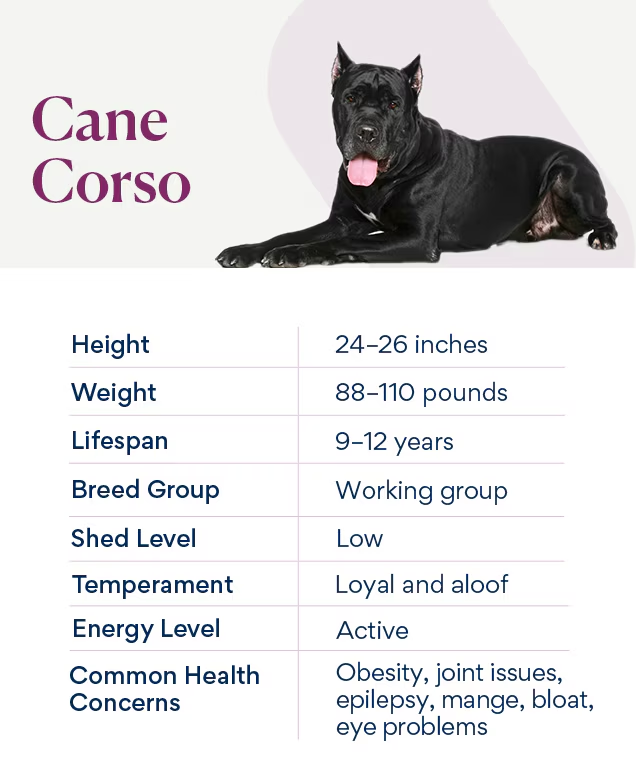Have you ever wondered how long a Cane Corso, a large and powerful breed of dog, can go without food? While it may seem like they have an insatiable appetite, these impressive canines can actually survive for quite some time without a meal.
Cane Corsos have a rich history as working dogs and have been bred for their endurance and resilience. This history has allowed them to develop a robust metabolism that enables them to go without food for extended periods of time. In fact, an adult Cane Corso can typically go without food for up to 7-10 days, although it is not recommended to push them to this limit. However, it is essential to provide regular and balanced meals to ensure their overall health and well-being. If you’re concerned about your Cane Corso’s appetite, it is always best to consult with a veterinarian to address any potential underlying issues and provide the best care for your furry friend.

How Long Can a Cane Corso Go Without Food?
As responsible pet owners, it’s crucial to understand our furry friends’ nutritional needs. For Cane Corsos, a popular and large breed of dog, proper feeding is essential for their health and well-being. One common question that often arises is: How long can a Cane Corso go without food? In this article, we will explore this topic in detail, covering various aspects of a Cane Corso’s food requirements, their ability to withstand hunger, and the potential risks of prolonged fasting.
1. The Importance of Regular Feeding
Proper nutrition is vital for maintaining a Cane Corso’s overall health and ensuring their energy levels and bodily functions are optimal. As a breed that is prone to certain health issues such as hip dysplasia and gastric torsion, providing regular balanced meals becomes even more crucial.
A Cane Corso can typically go up to 24 hours without food, but it is not recommended to allow them to fast for prolonged periods. Dogs, including Cane Corsos, have a high metabolic rate, and their digestive systems are designed to process regular meals. Prolonged fasting can lead to a range of health issues, including malnutrition, weakened immune system, and even organ damage.
It’s important to note that puppies and pregnant or nursing Cane Corsos have higher energy requirements and should not go without food for extended periods. Consult your veterinarian to determine the suitable feeding schedule and portion sizes for your individual Cane Corso based on their age, health condition, and activity level.
The Risks of Prolonged Fasting
While a healthy adult Cane Corso can tolerate short periods without food, prolonged fasting can have adverse effects on their health. Here are some of the potential risks:
1. Malnutrition: A lack of essential nutrients and vitamins can lead to malnutrition, affecting various bodily functions and weakening the dog’s overall health.
2. Weakened Immune System: Continuous fasting can compromise the immune system, making the dog more susceptible to infections and diseases.
3. Organ Damage: Prolonged fasting can put stress on a Cane Corso’s organs, potentially leading to liver or kidney damage.
4. Weight Loss: Regular feeding is necessary to maintain a healthy weight. Continuous fasting can result in unhealthy weight loss, leading to weakness and muscle atrophy.
To avoid these risks, it’s important to establish a consistent feeding routine for your Cane Corso and ensure they receive a balanced diet that meets their nutritional requirements. Regular meals also help maintain their energy levels and promote a healthy coat and skin.
2. Factors Influencing a Cane Corso’s Feeding Schedule
While it’s generally recommended to avoid prolonged fasting for Cane Corsos, there are certain factors that may influence their feeding schedule. Understanding these factors can help ensure your beloved pet remains healthy and happy.
1. Age: Puppies have higher energy requirements and should be fed multiple times a day. As they mature, the frequency of feedings can be adjusted according to their individual needs.
2. Activity Level: Cane Corsos are a high-energy breed and require regular exercise. More active dogs may need additional meals or increased portion sizes to meet their energy demands.
3. Health Condition: Dogs with specific health conditions, such as diabetes or gastrointestinal issues, may require a specific feeding schedule or a prescription diet. Consult with your veterinarian for personalized feeding recommendations.
4. Weight Management: If your Cane Corso is overweight or underweight, your veterinarian may suggest adjusting the feeding schedule or portion sizes to help them achieve a healthy weight.
Consider these factors alongside your veterinarian’s guidance to determine the most suitable feeding schedule for your Cane Corso. Remember to monitor their body condition, energy levels, and overall health to make any necessary adjustments.
Tips for Maintaining a Healthy Feeding Routine
Establishing a healthy feeding routine for your Cane Corso is crucial for their well-being. Here are a few tips to help you maintain a balanced and consistent feeding schedule:
1. Set Regular Meal Times: Establish fixed meal times to create a routine. This helps regulate their digestion and prevents erratic feeding habits.
2. Measure Portions: Use a measuring cup or scale to ensure accurate portion sizes. This helps prevent overfeeding or underfeeding, maintaining a healthy weight.
3. Avoid Free-Feeding: Leaving food out all day may lead to overeating or irregular eating habits. Stick to scheduled meal times to provide structure and prevent obesity.
4. Choose High-Quality Food: Opt for premium dog food that is specifically formulated for large breeds, taking into account their nutritional needs. Consult with your veterinarian for recommendations.
5. Provide Fresh Water: Always make sure your Cane Corso has access to clean and fresh water throughout the day. Hydration is vital for overall health and digestion.
Remember, proper feeding goes hand in hand with regular exercise and veterinary care to ensure the optimal health and happiness of your Cane Corso.
Conclusion
In conclusion, it is not recommended to allow a Cane Corso to go without food for prolonged periods. While they can tolerate short periods of fasting, regular feeding is essential for their health and well-being. Prolonged fasting can lead to various health issues, including malnutrition, weakened immune system, and organ damage. It’s crucial to establish a consistent feeding schedule, provide a balanced diet, and consult with your veterinarian for personalized recommendations based on your Cane Corso’s age, health condition, and activity level. By prioritizing their nutritional needs, you can help ensure a long and healthy life for your beloved Cane Corso.
Key Takeaways – How Long Can a Cane Corso Go Without Food?
- A healthy adult Cane Corso can go without food for approximately 3 to 5 days.
- Puppies and elderly Cane Corsos have a higher metabolic rate and should not go without food for more than 24 hours.
- It is essential to monitor your Cane Corso’s behavior and consult with a veterinarian if they refuse to eat for more than a day.
- Dehydration is a more immediate concern for dogs, so ensuring access to fresh water is crucial even if they are not eating.
- If your Cane Corso is experiencing a prolonged loss of appetite, it could be a sign of an underlying health issue and should be addressed by a professional.
Frequently Asked Questions
Are you wondering how long a Cane Corso can go without food? Read on to find answers to common questions about the feeding habits of this breed.
1. Is it normal for a Cane Corso to go without food for a day?
While it’s not ideal, it is normal for a healthy Cane Corso to go without food for a day or two. Dogs have a natural instinct to fast periodically, mimicking their wild ancestors. However, if your Cane Corso refuses to eat for more than 48 hours, it’s time to consult a veterinarian to rule out any underlying health issues.
2. How long can a Cane Corso safely go without eating?
A Cane Corso can typically go without eating for up to three days without experiencing any major health risks. However, this should not be a regular occurrence and should be monitored closely. Consult your vet to rule out any underlying health conditions and to determine the best course of action if your dog goes without food for more than a day.
3. What are the signs that my Cane Corso is not eating enough?
If your Cane Corso is not eating enough, you may notice a decrease in energy levels, weight loss, a dull coat, and signs of lethargy. Additionally, your dog may show disinterest in their food, take longer to finish meals, or completely refuse to eat. Pay close attention to any changes in appetite and consult your veterinarian if you have concerns.
4. Can I encourage my Cane Corso to eat when they refuse food?
While it’s normal for a Cane Corso to occasionally refuse food, it’s important not to force them to eat. Forcing a dog to eat can lead to negative associations with food and create long-term issues. Instead, try offering a variety of high-quality, palatable foods, warming the food slightly, or adding a tasty topper to entice your dog to eat. If the refusal to eat persists, consult your vet.
5. How can I prevent my Cane Corso from going without food?
The best way to prevent your Cane Corso from going without food is to establish a consistent feeding routine. Feed your dog at the same times each day and ensure that they have a balanced and nutritious diet. If your dog consistently refuses food or shows signs of health issues, consult your veterinarian for further guidance.

Feeding schedules and portion sizes should be determined based on the individual cane corso’s age, size, activity level, and overall health. Regular feeding, typically two meals a day, is recommended to meet their nutritional needs and energy requirements. Consulting with a veterinarian can help establish a suitable feeding plan for a cane corso.
